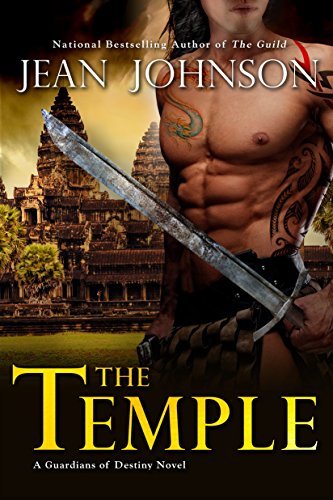 The Temple (Guardians of Destiny #4) by Jean Johnson
The Temple (Guardians of Destiny #4) by Jean Johnson Format: ebook
Source: purchased from Amazon
Formats available: ebook
Genres: fantasy romance
Series: Guardians of Destiny #4
Pages: 333
Published by Penguin on February 20, 2018
Purchasing Info: Author's Website, Publisher's Website, Amazon, Barnes & Noble, Kobo
Goodreads
Synod gathers, tell them lies:
Efforts garnered in your pride
Lost beneath the granite face.
Painted Lord, stand by her side;
Repentance is the Temple's grace.The Guardian of the Fountain of Mendhi is dying, and her successor must step up to the task. Disciplinarian Pelai is ready to accept the burden of managing the powerful magics, but the timing is inconvenient. She has one last Disciplining to perform: assigning the punishment of the three Puhon brothers--men whose lives are entwined with a prophecy of a cataclysmic demonic invasion.
Six months of travel have given Puhon Krais time to reflect on, regret, and repent his many mistakes. But the worst lies just ahead: defying the leadership of Mendhi means suffering harsh punishments at the hands of the Disciplinarians once he comes home. Commanded by his Goddess, the proud Painted Warrior must find the strength to submit to his destiny...or find himself, and his whole world, on the wrong side of history.
For in the end, one brother is destined to save humanity, one will betray humanity, and one will walk away from his humanity.
My Review:
I’ve frequently said that the wait between Jean Johnson’s books is a torment. That’s both especially true in the case of The Temple (it’s been four YEARS!) and especially appropriate in light of the story itself.
Waiting for fulfillment is just one of the sweet torments practiced by the Disciplinarians of the Temple of Menda in this fourth book in the Guardians of Destiny series. Although in the story it’s usually a different kind of delayed gratification used in that torment.
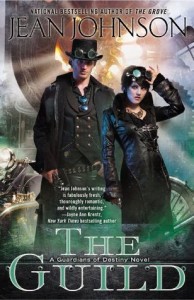 This story takes place in the aftermath of the events of the previous books in the series, The Tower, The Grove, and especially The Guild. At the same time, it also follows the pattern set by those stories, and the prophetic verses that begin each book in the series.
This story takes place in the aftermath of the events of the previous books in the series, The Tower, The Grove, and especially The Guild. At the same time, it also follows the pattern set by those stories, and the prophetic verses that begin each book in the series.
Two of those events have particular bearing on this story. In this world, nations exist to worship a particular deity, or perhaps two. Those deities are not myths, they are real and can manifest in the world. And occasionally do.
The societies reflect their god, and the gods reflect their society. One of the recent events that is still reverberating is the just finished Convocation of Gods and Man, where new nations and new gods are ratified, and gods that have really, really misbehaved get dissolved by their peers.
At the Convocation, the god Mekha was dissolved. His former country is picking up the pieces under the guidance of the Guardians Alonnen and Rexei. Their story is told in The Guild.
But the priests who served Mekha and were powerful because of that service are not willing to go gentle into that good night. Instead, they are desperately searching for any means, no matter how underhanded or terrible, to become powerful again. And they’re not in the least picky about what they’ll have to do, manifest, or summon in order to retake their lost power. Up to and including raising demons from the Netherhells.
The Guardians in all of the lands of this world are studying the prophecies in order to thwart them, and it is far from an easy job. Changing circumstances in one area can make things better in another – or it can actually make things worse later on.
It’s a big butterfly, and the wing flaps can have some seriously nasty consequences if everyone on the side of the light isn’t very, very careful.
The priests power-search has led them to the Great Library of Mendhi, and that’s where that part of the overarching story intersects with both the romance at the heart of this book in the series and the careful balancing of prophecies to make sure that what must happen does happen.
The country that hosts the Convocation gathers a lot of political power, and that ties into the rest of the events. The Elder Disciplinarian of Mendhi sent his three sons on to the Convocation in an attempt to disrupt it and move the location to Mendhi. All the gods were against this attempt, and all the prophecies were clear that this attempt would fail, but the Elder Disciplinarian and his political party refused to be swayed.
The Puhon Brothers have returned home, having failed as expected. Equally, their father expects them to be officially punished for their failure. Which kicks off another round of prophecy, as well as a surprising romance between two people who used to think of each other as enemies, only to discover that they are perfect for each other, after all.
Or after all the prophecies have had their way.
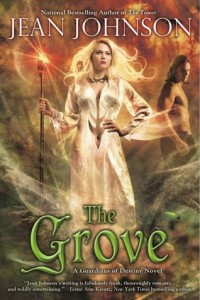 Escape Rating B+: In spite of the high grade, this is still a mixed feelings kind of review.
Escape Rating B+: In spite of the high grade, this is still a mixed feelings kind of review.
First, I have to admit that I loved this story, and found myself sinking right back into this world, even after the unfortunate long absence. It took awhile for all of the threads from the previous books to gather back into my conscious, but the process was helped by a fair amount of backstory that was worked reasonably well into the story at hand.
This entry in the series is a particularly interesting mixture of sex and politics. There are aspects of the Disciplinarian Order and its administration that will remind readers a bit of Kushiel’s Dart. And like that series, it is made very clear in The Temple that discipline is not all about pain, and that people exist at every point on the pleasure/pain/dominance/submission grid. While there is more “academic” discussion of sex and desire than is usual in most romances, and it goes into quite a bit of interesting territory, there is more discussion than there is actual sex. Or even sexual play and exploration.
I found the discussions to be fascinating and very tastefully done, but there are some readers who may be made uncomfortable. As the discussion within the story is about each person finding what works for them, it seems appropriate to say that it won’t work for some people but it will work for others and that reading it with an open mind may be enlightening.
Your mileage may vary.
The politics of this particular country are very interesting. The Goddess Menda is the goddess of writing, so books and libraries are under her purview. (So is bureaucracy!) That one of the members of the ruling body is the Elder Librarian certainly warmed this librarian’s heart – especially when she invoked powerful spells to protect the secrets of the Great Library.
As much as I enjoyed the story, and as absorbing as I found it, this missed being an A grade because the editing was so terrible that it often threw me out of the story. I read a lot of ARCs, and in an ARC I expect editing errors – that’s part of what the ARC process is for. But this was a finished book, and it contained so many typos and word errors that occasionally even the meaning was obscure and I had to reread in order to put the pieces together.
But once I did piece it together, it was a lot of fun. I just wish that it hadn’t been quite so long since the previous book in the series, and I sincerely hope that it won’t be nearly this long until the next one.

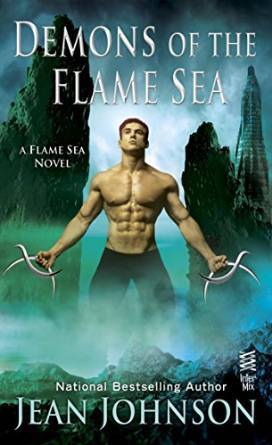 Demons of the Flame Sea by
Demons of the Flame Sea by  This is the book that Dawn of the Flame Sea should have been.
This is the book that Dawn of the Flame Sea should have been. 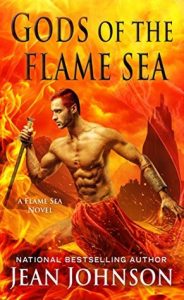 We also see the slow warming of what will eventually become a romance between Ban and Jintaya. Ban is immortal and Jintaya is extremely long-lived. They have all the time in the universe to work their way towards an emotional and physical partnership, and it looks like they plan to take it. It’s a very different way of writing a romance, but it works well in this instance.
We also see the slow warming of what will eventually become a romance between Ban and Jintaya. Ban is immortal and Jintaya is extremely long-lived. They have all the time in the universe to work their way towards an emotional and physical partnership, and it looks like they plan to take it. It’s a very different way of writing a romance, but it works well in this instance.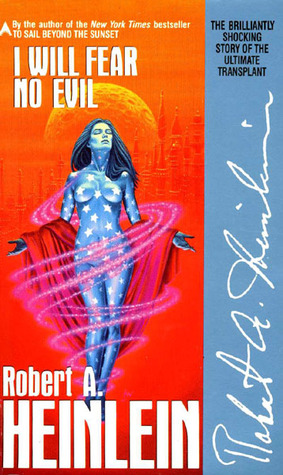 I Will Fear No Evil by
I Will Fear No Evil by  Robert Heinlein, often dubbed “the Dean of Science Fiction,” is a difficult author to review, in my opinion. My first exposure to Heinlein was
Robert Heinlein, often dubbed “the Dean of Science Fiction,” is a difficult author to review, in my opinion. My first exposure to Heinlein was  For an example of this, and as a glance at Heinlein’s commentary on society, take a look at
For an example of this, and as a glance at Heinlein’s commentary on society, take a look at 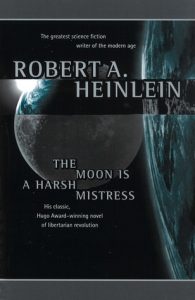 Marlene’s Note: A review of one of Heinlein’s works in singularly appropriate for this particular weekend. I will be at the World Science Fiction Convention in Kansas City, and Heinlein’s name will be invoked multiple times in multiple contexts. The context that would be nearest-and-dearest to his heart if he were still among us will be the
Marlene’s Note: A review of one of Heinlein’s works in singularly appropriate for this particular weekend. I will be at the World Science Fiction Convention in Kansas City, and Heinlein’s name will be invoked multiple times in multiple contexts. The context that would be nearest-and-dearest to his heart if he were still among us will be the 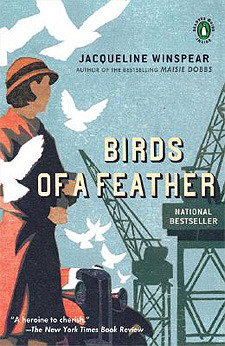 Birds of a Feather (Maisie Dobbs #2) by
Birds of a Feather (Maisie Dobbs #2) by 